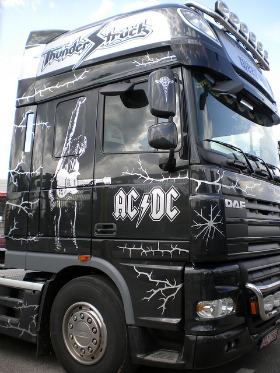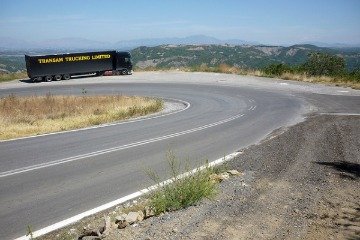Must be a great job to travel?
When dealing with rush hour traffic in Milan, you don’t want to think about which of the 16 gears to engage!
definitely! I have toured all over Europe: north to Finland and Norway, east to Moscow and St. Petersburg, south to Istanbul and Portugal, and west to Cork, Ireland. It’s a great way to see a lot of European cities, especially the capitals. But it’s not a holiday – the job has to come first. There will be occasions when you are in Berlin or Barcelona for example, but you don’t have enough time to get out and about. But the same cities appear all the time, so there will always be another opportunity to explore.
Sometimes you’ll feel lethargic and sleep-deprived, and it would be so easy to just hang out at the party, drink countless free cups of coffee, and relax with your mates. But other times, you’ll feel refreshed after a 24-hour ferry ride from Italy to Greece, with just a three-hour drive and the prospect of a two-day vacation in Athens.
Unfortunately, I cannot travel outside of Europe. When the tour continues around the world, the lighting, sound and video technicians and other crew members stay with it, but the drivers stay here. We simply exchange another round instead. It will be possible to tour the United States, but only if you have the elusive work permit.
What are the other advantages? What are the negatives?


Heavy metal trucking!
Other than traveling, the obvious advantage is that you’ll see some great shows, and maybe even get to see your favorite band. Although by the 20th show of the tour, the novelty may start to wear off. You’ll also meet a lot of interesting people, many of whom drifted into the industry from routes other than trucking.
On the downside, you’re disturbing your body clock for long periods of time. And you can’t call in sick. It’s no good saying you have a tummy ache after dinner – no one can fly into Zurich and take your place on the overnight flight to Munich. You will sleep in a truck. But you’ll get used to it – it’s just like camping, and there are always showers and toilets in places.
What skills, training and qualifications do you need?
You need an HGV licence. There’s no way around that, and it’s not cheap. I think it would cost around £1,500 – assuming you pass the test the first time – but it may be more now.
But nowadays, you can’t go straight to Class 1, maximum weight articulated vehicles. You have to undergo training on small trucks first, then pass tests on them and then work your way up to larger trucks. Having said that, there is work for 7.5-tonne trucks on tour (small club gigs rather than stadiums) and also for 17-tonne rigid trucks.
You also need to apply for a digital card – a credit card-style digital alternative to the analogue tachograph (a system that records speed and distance in a truck). From the age of 45, you must pass a medical examination every five years to keep your licence. Finally, you need a driver CPC, which also needs to be renewed every five years. There is currently a lot of confusion around this, so if you are serious about getting a licence, your training station will keep you updated.
More than anything else, you need a lot of driving experience – when negotiating Milan’s rush hour traffic, you don’t want to think about which of the 16 gears to engage!





